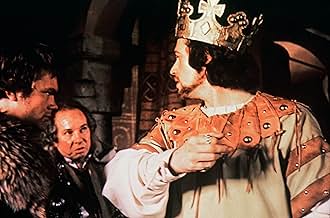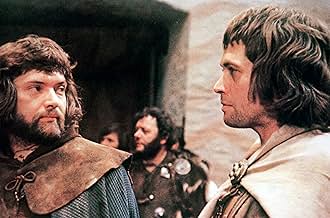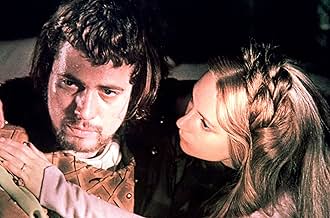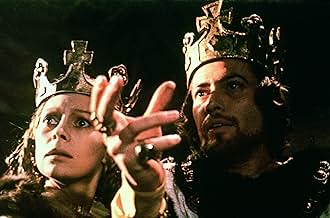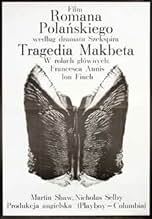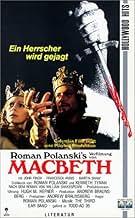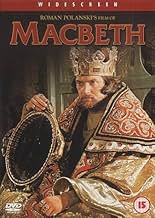AVALIAÇÃO DA IMDb
7,4/10
16 mil
SUA AVALIAÇÃO
Um implacável e ambicioso escocês assume o trono com a ajuda da sua esposa e um trio de bruxas.Um implacável e ambicioso escocês assume o trono com a ajuda da sua esposa e um trio de bruxas.Um implacável e ambicioso escocês assume o trono com a ajuda da sua esposa e um trio de bruxas.
- Direção
- Roteiristas
- Artistas
- Ganhou 1 prêmio BAFTA
- 3 vitórias e 2 indicações no total
- Direção
- Roteiristas
- Elenco e equipe completos
- Produção, bilheteria e muito mais no IMDbPro
Avaliações em destaque
Dark, bloody and brooding version of Shakespeare's play about a doomed Scottish king who was, according to his wife, Lady MacBeth "too full of the milk of human kindness to catch the nearest way". This is one of Shakespeare's later plays and is entirely devoid of some of the lighter moments prevalent in his earlier work.
Macbeth, a loyal Scottish thane and a cousin of King Duncan, is waylaid with his companion, Banquo, by three witches who prophesise that he will become king and that Banquo will beget kings. Once MacBeth has informed his wife of these predictions, he is propelled by her and by his own lust for power on a journey of self-destruction leading ultimately to madness. In his determination to bring about the witches' predictions, he kills his liege-lord, steals the crown from the rightful heirs, who flee into exile on suspicion of regicide and patricide, then orders the secret murder of ally and friend Banquo and Banquo's son Fleance. So begins a descent into a nightmare existence, replete with ghostly apparitions, sleepless angst and withering self-doubt. Gradually mutual distrust emerges between himself and the nobles whose support maintains his position, and eventually he murders the wife and children of one MacDuff, an act which symbolises the horror he has become. MacDuff, along with other Scottish nobles, has joined the exiled heir, Malcolm, who lives under the protection of the English king. An army of rebellion - or liberation - is brought to bear on MacBeth's stronghold, whilst inside, MacBeth has begun "to grow aweary of the sun". The witches have told him that he cannot be killed by any "man of woman born". But, in the final fight scene, he learns too late that MacDuff "was, from his mother's womb, untimely ripped" and that the witches have, in Banquo's words from the start of the play, won him "with honest trifles" and betrayed him "in deepest consequence", and his destruction is complete.
This is a suitably melancholic reading, full of images of blood, of sombre leaden skies, of torrential downpours and of thickset, bearded nobles. Scotland is presented as a gloomy outcrop on the edge of the known world and the sun has been heavily filtered by Polanski, giving the film a surreal and eerie feel and stressing the superstitious environment in which the play is set. We are also treated to a fair representation of the early Middle Ages, a time when travelling lords and ladies and their kith and kin slept communally on straw in the great halls, side by side with their massive hunting dogs.
The obviously archaic dialogue has been abridged and everso slightly updated for modern audiences. The lines are delivered eloquently by the two leads, Jon Finch and Francesca Annis, who are well matched as the doomed couple, and this clipped entry would be a good introduction to Shakespeare for those of the MTV-set with a literary inclination. All in all a good stab at bringing Shakespeare into the twentieth century and an effort which the bard himself might well have smiled upon.
Macbeth, a loyal Scottish thane and a cousin of King Duncan, is waylaid with his companion, Banquo, by three witches who prophesise that he will become king and that Banquo will beget kings. Once MacBeth has informed his wife of these predictions, he is propelled by her and by his own lust for power on a journey of self-destruction leading ultimately to madness. In his determination to bring about the witches' predictions, he kills his liege-lord, steals the crown from the rightful heirs, who flee into exile on suspicion of regicide and patricide, then orders the secret murder of ally and friend Banquo and Banquo's son Fleance. So begins a descent into a nightmare existence, replete with ghostly apparitions, sleepless angst and withering self-doubt. Gradually mutual distrust emerges between himself and the nobles whose support maintains his position, and eventually he murders the wife and children of one MacDuff, an act which symbolises the horror he has become. MacDuff, along with other Scottish nobles, has joined the exiled heir, Malcolm, who lives under the protection of the English king. An army of rebellion - or liberation - is brought to bear on MacBeth's stronghold, whilst inside, MacBeth has begun "to grow aweary of the sun". The witches have told him that he cannot be killed by any "man of woman born". But, in the final fight scene, he learns too late that MacDuff "was, from his mother's womb, untimely ripped" and that the witches have, in Banquo's words from the start of the play, won him "with honest trifles" and betrayed him "in deepest consequence", and his destruction is complete.
This is a suitably melancholic reading, full of images of blood, of sombre leaden skies, of torrential downpours and of thickset, bearded nobles. Scotland is presented as a gloomy outcrop on the edge of the known world and the sun has been heavily filtered by Polanski, giving the film a surreal and eerie feel and stressing the superstitious environment in which the play is set. We are also treated to a fair representation of the early Middle Ages, a time when travelling lords and ladies and their kith and kin slept communally on straw in the great halls, side by side with their massive hunting dogs.
The obviously archaic dialogue has been abridged and everso slightly updated for modern audiences. The lines are delivered eloquently by the two leads, Jon Finch and Francesca Annis, who are well matched as the doomed couple, and this clipped entry would be a good introduction to Shakespeare for those of the MTV-set with a literary inclination. All in all a good stab at bringing Shakespeare into the twentieth century and an effort which the bard himself might well have smiled upon.
To get the obvious out of the way- Roman Polanski directed Macbeth as the first film following the death of his wife, Sharon Tate, and unborn child at the hands of Charles Manson's gang. That factor in the film- not least of which in small details, like the first shot after the opening credits where a man finishing slaying someone looks just like Manson, beard and all- is undeniable, but it shouldn't be counted as the sole influence. Aside from the purging, as far as I can figure, Polanski was doing for himself by going all out in showing the frank and bloody depictions of violence and almost cleansing (as Lady Macbeth would do in madness) of blood on hands that could never come off, of the sort of psychological impact of violence and its aftermath, it was a bloody time in the world and in films. As Vietnam continued to go on, the best films of 1971- and Macbeth could be counted as one of them- were some of the most stylish and explicit in how they attacked systems of government, corruption, and bad-ass anti-heroes or outright villains (A Clockwork Orange and Dirty Harry come immediately to mind). It would practically be dishonest, in a sense, for Polanski not to show how grotesque the acts of murder that, for example, Macbeth's men do on MacDuff's family and servants, or the simple, sadistic carnage of Macbeth's final curtain call in the climax, considering the mood and controversies of the period.
Compared to some of the really radical films of the year, however, Macbeth's story is as old and cherished as children's fables. Yes, children, you all remember the story of ambitious young Macbeth, prodded on by the alleged prophecies of three weird witches, who murders the king by his own (and his wife's) accord, and soon goes mad as power grips him into overreaching his domain and believing himself to be invincible to all but a fleet of woods. Not really too much happiness in Shakespeare's work, and all the better, as it might be his masterpiece: a saga of the frailties of the human conscience and abstractions of consciousness, where the supernatural substitutes just as well for faith in some religious calling- and a questioning and doubt throughout- and what it does to those around the Mr & Mrs who still can't cope deep down with killing a man in the dead of night. Yet even more incredible is that Polanski, as well as Kurosawa with Throne of Blood, enrich the material with the film adaptations, changing around some scenes, omitting some altogether, and offering brands of surrealism based on preferred styles.
While Kurosawa stuck to the Noh method for much of his film, Polanski's Macbeth is an atmospheric milestone as far as concrete production design can go (never once does it feel like they used a fake castle, or much of a fake set even), and all the grays and dark Earth colors, especially when Macbeth goes to the witches a second time, blend into something that matches the psychological conundrum of the king of Scotland and his desperate wife. But seeing Polanski take things further, with touches of the bizarre (the floating and illusionary dagger, the drops of blood in Lady's hands, and the spectacular scene of Macbeth seeing through the windows, shot in a hazy and pirouetting camera), and showing what was only alluded to in strange and exciting ways- the killing scene in the bedroom feels almost like the Psycho shower scene, missed stabs and the messy quality of it all, only from the guilty party's point of view. This, plus the attention to detail in storytelling, the nuanced and gleefully over-the-top dialog provided very close to the original text, and even hand-held camera-work right out of something in Repulsion, makes this a work of daring for Polanski, not simply in the realm of elaborate fights (though there is that) or blood-shed (a lot of that) or decapitations (one or two gushing ones).
Though not to forget as part of the success too, aside from the director's total control of mis-en-scene, are the actors. Jon Finch, who also appeared in Frenzy, is a tightly wound loose cannon, if that makes sense, whose voice-over narration sometimes blends in with talking to himself, and the look in his eyes sometimes tells all, or perhaps not, as case might be. Although Welles and Mifune have their fair share of great Macbeth points in other films, Finch proves himself as on their same level, if only for this one moment in his career. Also very noteworthy (albeit such a meaty part for any actress) is Francessa Annis as Lady Macbeth, and Terence Baylor as MacDuff, and Stephan Chase as Malcolm is a very good choice. And as usual Polanski populates his picture with effective faces, strange looks that seem very conventional and at the same time all apart of the visual and mood. I loved seeing the whole room of witches, most naked (thanks to Hugh Hefner mayhap), and it almost seeming as if a bare minimum of make-up was used.
Bottom line, if you're looking for a hallmark of the dark literary drama, or a disturbing tale of the madness of power, or just a classic Polanski film, it's all here.
Compared to some of the really radical films of the year, however, Macbeth's story is as old and cherished as children's fables. Yes, children, you all remember the story of ambitious young Macbeth, prodded on by the alleged prophecies of three weird witches, who murders the king by his own (and his wife's) accord, and soon goes mad as power grips him into overreaching his domain and believing himself to be invincible to all but a fleet of woods. Not really too much happiness in Shakespeare's work, and all the better, as it might be his masterpiece: a saga of the frailties of the human conscience and abstractions of consciousness, where the supernatural substitutes just as well for faith in some religious calling- and a questioning and doubt throughout- and what it does to those around the Mr & Mrs who still can't cope deep down with killing a man in the dead of night. Yet even more incredible is that Polanski, as well as Kurosawa with Throne of Blood, enrich the material with the film adaptations, changing around some scenes, omitting some altogether, and offering brands of surrealism based on preferred styles.
While Kurosawa stuck to the Noh method for much of his film, Polanski's Macbeth is an atmospheric milestone as far as concrete production design can go (never once does it feel like they used a fake castle, or much of a fake set even), and all the grays and dark Earth colors, especially when Macbeth goes to the witches a second time, blend into something that matches the psychological conundrum of the king of Scotland and his desperate wife. But seeing Polanski take things further, with touches of the bizarre (the floating and illusionary dagger, the drops of blood in Lady's hands, and the spectacular scene of Macbeth seeing through the windows, shot in a hazy and pirouetting camera), and showing what was only alluded to in strange and exciting ways- the killing scene in the bedroom feels almost like the Psycho shower scene, missed stabs and the messy quality of it all, only from the guilty party's point of view. This, plus the attention to detail in storytelling, the nuanced and gleefully over-the-top dialog provided very close to the original text, and even hand-held camera-work right out of something in Repulsion, makes this a work of daring for Polanski, not simply in the realm of elaborate fights (though there is that) or blood-shed (a lot of that) or decapitations (one or two gushing ones).
Though not to forget as part of the success too, aside from the director's total control of mis-en-scene, are the actors. Jon Finch, who also appeared in Frenzy, is a tightly wound loose cannon, if that makes sense, whose voice-over narration sometimes blends in with talking to himself, and the look in his eyes sometimes tells all, or perhaps not, as case might be. Although Welles and Mifune have their fair share of great Macbeth points in other films, Finch proves himself as on their same level, if only for this one moment in his career. Also very noteworthy (albeit such a meaty part for any actress) is Francessa Annis as Lady Macbeth, and Terence Baylor as MacDuff, and Stephan Chase as Malcolm is a very good choice. And as usual Polanski populates his picture with effective faces, strange looks that seem very conventional and at the same time all apart of the visual and mood. I loved seeing the whole room of witches, most naked (thanks to Hugh Hefner mayhap), and it almost seeming as if a bare minimum of make-up was used.
Bottom line, if you're looking for a hallmark of the dark literary drama, or a disturbing tale of the madness of power, or just a classic Polanski film, it's all here.
How does one do justice to one of the most nihilistic murderers in the history of drama? Even Richard the Third has a sense of humor. but once MacBeth buys into the witch's prophecy (which he doesn't have to do) - it's all straight to hell from there. Even his wife finally gets the idea that 'When you choose to ride the tiger, you don't get off' as one Confucian wit put it, long ago....
This is the film that put an end to the "high-school" Shakespeare that we all had to suffer through in the 1960s. That Shakespeare was dull, lifeless, meaninglessly conservative - everyone hated him. In America, we had heard about Peter Brooks, and about an all-nude MacBeth (which of course never happened, the reference was to the "out damn spot' scene, just as we see in this movie); and there were the legendary Orson Welles versions that were, unfortunately, wholly unavailable at the time. Then Zeffirelli made his Romeo and Juliet, showing Romeo's bare butt, even in the ad for the film, and we started getting the glimmer that Shakespeare had been a real person writing about other real people - then came Polanski's MacBeth.
I won't lie and tell you that this is the definitive MacBeth - or even that it's a really great movie - all of the actors seem like they are way over their heads in this material.
But Polanski's purely cinematic bravado pulls it off. Right from the beginning, watching a medieval warrior beat his opponent into a bloody pulp, we are drawn into a world where violence is the only truth we can believe - pretty much as MacBeth himself sees it.
From this point on, there was no turning back. The Shakespeare we inherit from this film may not be the one we want, but he is certainly a playwright of Elizabethan England (which the "high-school" Shakespeare never was).
That makes this film really important - at least until the definitive version actually gets made (and it hasn't, yet...).
This is the film that put an end to the "high-school" Shakespeare that we all had to suffer through in the 1960s. That Shakespeare was dull, lifeless, meaninglessly conservative - everyone hated him. In America, we had heard about Peter Brooks, and about an all-nude MacBeth (which of course never happened, the reference was to the "out damn spot' scene, just as we see in this movie); and there were the legendary Orson Welles versions that were, unfortunately, wholly unavailable at the time. Then Zeffirelli made his Romeo and Juliet, showing Romeo's bare butt, even in the ad for the film, and we started getting the glimmer that Shakespeare had been a real person writing about other real people - then came Polanski's MacBeth.
I won't lie and tell you that this is the definitive MacBeth - or even that it's a really great movie - all of the actors seem like they are way over their heads in this material.
But Polanski's purely cinematic bravado pulls it off. Right from the beginning, watching a medieval warrior beat his opponent into a bloody pulp, we are drawn into a world where violence is the only truth we can believe - pretty much as MacBeth himself sees it.
From this point on, there was no turning back. The Shakespeare we inherit from this film may not be the one we want, but he is certainly a playwright of Elizabethan England (which the "high-school" Shakespeare never was).
That makes this film really important - at least until the definitive version actually gets made (and it hasn't, yet...).
Roman Polanski's blood-soaked version of Shakespeare's Scottish play was the video version of choice when we were studying this at school, in spite of it having a nude Lady Macbeth and witches (and Keith Chegwin in the cast - he's Banquo's son).
Jon Finch has the lead and he is exceptionally good. Even a dagger which really appears to float before him (an effect not needed) doesn't spoil things. Odd that he never really got good movie roles after this. His Lady M is Francesca Annis, a spider of a schemer, also putting in a good performance.
Less adequate are Martin Shaw as Banquo, Stephan Chase as Malcolm, and Sydney Bromley as the Porter, although Terence Bayler gives good value as Macduff.
Perhaps this Macbeth is the first one to be truly cinematic, something that even Orson Welles couldn't achieve with Scots accents and Scandinavian settings. It remains memorable long after seeing and, in its excesses, opens up the text for a new generation, and finally, sees the repellent murdering usurper get what he deserves.
(Incidentally for perspective, the book 'Macbeth - man and myth' by Nick Aitchison looks at the real historic facts in accessible coffee-table book style).
Jon Finch has the lead and he is exceptionally good. Even a dagger which really appears to float before him (an effect not needed) doesn't spoil things. Odd that he never really got good movie roles after this. His Lady M is Francesca Annis, a spider of a schemer, also putting in a good performance.
Less adequate are Martin Shaw as Banquo, Stephan Chase as Malcolm, and Sydney Bromley as the Porter, although Terence Bayler gives good value as Macduff.
Perhaps this Macbeth is the first one to be truly cinematic, something that even Orson Welles couldn't achieve with Scots accents and Scandinavian settings. It remains memorable long after seeing and, in its excesses, opens up the text for a new generation, and finally, sees the repellent murdering usurper get what he deserves.
(Incidentally for perspective, the book 'Macbeth - man and myth' by Nick Aitchison looks at the real historic facts in accessible coffee-table book style).
To say that this adaptation is a bit of a bloodbath is a bit of an understatement, but you cannot deny that this film from Roman Polanski is quite possibly the definitive film version of Shakespeare's play, which is very complicated to even contemplate transcribing to screen. The cinematography is excellent, as is the script. It is true that there are a lot of disturbing scenes, chiefly Lady Macbeth's nude sleepwalker scene and King Duncan's death. Roman Polanski should be commended for how much he managed to get into the film, and he somehow made it all effective. Any scene with the three witches, the murder of Macduff's family, plus the part when Macbeth sees Banquo's ghost was very well done.(I saw an amateur production of this, and not only was it disappointing, but that particular scene was the worst aspect of it) The performances were brilliant, Jon Finch(who did start off uncomfortable) is great on the whole as the treacherous thane-turned-king, and Francessca Annis was nigh-on-perfect as Lady Macbeth. And Martin Shaw was excellent as Banquo. From the suitably eerie opening scene, to the superb climax, this is a near-perfect adaptation, there were just some bits that were really disturbing to watch, that deserves more recognition. 9/10 Bethany Cox
Você sabia?
- CuriosidadesMark Dightam, who was eleven when he controversially appeared full frontally naked as MacDuff's son, was not allowed to see the film when it was released because it had been classified AA and he was under 14 at the time.
- Erros de gravaçãoThe lyrics to the song that Fleance sings at Macbeth's banquet for Duncan at Inverness are taken from the poem "Merciles Beautè" by Geoffrey Chaucer. In the context of the film this extraneously inserted song is itself an anachronism, as Chaucer lived in the fourteenth century and Shakespeare's "Macbeth" historically takes place in the eleventh century.
- ConexõesFeatured in Aquarius: Two Macbeths/Hayward Gallery/Ravi Shankar (1972)
Principais escolhas
Faça login para avaliar e ver a lista de recomendações personalizadas
- How long is Macbeth?Fornecido pela Alexa
Detalhes
- Data de lançamento
- Países de origem
- Central de atendimento oficial
- Idioma
- Também conhecido como
- Bi Kịch Của Macbeth
- Locações de filme
- Lindisfarne Castle, Holy Island of Lindisfarne, Northumberland, Inglaterra, Reino Unido(Glamis Castle, Inverness)
- Empresas de produção
- Consulte mais créditos da empresa na IMDbPro
Bilheteria
- Orçamento
- US$ 3.100.000 (estimativa)
- Tempo de duração2 horas 20 minutos
- Cor
- Proporção
- 2.35 : 1
Contribua para esta página
Sugerir uma alteração ou adicionar conteúdo ausente



